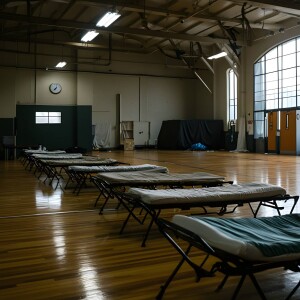Aced It
The Aced It podcast is the place to go if you‘re trying to find out what‘s new in the health and justice research world, but don‘t have the time, energy, or know-how to decipher all that academic writing. Dr. Danielle Rudes and Shannon Magnuson from the Center for Advancing Correctional Excellence (ACE!) at George Mason University developed the Aced It! podcast to bring relevant research articles to a broader audience by putting them into layperson’s terms sharing the findings and implications in about 15 minutes.
Episodes

Tuesday Jun 24, 2025
Support Groups and Treatment for Loved Ones
Tuesday Jun 24, 2025
Tuesday Jun 24, 2025
In the final episode of this season, I discuss support groups and treatment for the loved ones of people with SUD and overdose incidents. I review the literature on the coping mechanisms of bereaved loved ones, look at the formation and impact of peer-support groups, review therapy techniques to help people navigate grief after a drug-related death, and discuss the challenges of accessing support in general.
Download the one-pager (PDF).
This project was supported by Grant [5PBJA-22-AG-00031-MUMU] awarded by the Bureau of Justice Assistance. The Bureau of Justice Assistance is a component of the Office of Justice Programs, which also includes the Bureau of Justice Statistics, the National Institute of Justice, the Office of Juvenile Justice and Delinquency Prevention, the Office for Victims of Crime, and Office of Sex Offender Sentencing, Monitoring, Apprehending, Registering, and Tracking. Points of view or opinions in this podcast are those of the host and the research team and do not necessarily represent the official position or policies of the U.S. Department of Justice.

Tuesday Jun 17, 2025
Loved Ones and SUD and Overdose in Rural Areas
Tuesday Jun 17, 2025
Tuesday Jun 17, 2025
In this episode, I talk about loved ones, addiction, and overdose in the context of rural areas. First, I review important context and statistics, including how rural Americans are at higher risk of overdose. Then I discuss research on family roles in prescription opioid misuse prevention, risk factors for drug misuse and disease among young people, and how rural women who use drugs perceive their social networks.
Download the one-pager (PDF).
This project was supported by Grant [5PBJA-22-AG-00031-MUMU] awarded by the Bureau of Justice Assistance. The Bureau of Justice Assistance is a component of the Office of Justice Programs, which also includes the Bureau of Justice Statistics, the National Institute of Justice, the Office of Juvenile Justice and Delinquency Prevention, the Office for Victims of Crime, and Office of Sex Offender Sentencing, Monitoring, Apprehending, Registering, and Tracking. Points of view or opinions in this podcast are those of the host and the research team and do not necessarily represent the official position or policies of the U.S. Department of Justice.

Tuesday Jun 10, 2025
Having Unhoused Loved Ones with Addiction
Tuesday Jun 10, 2025
Tuesday Jun 10, 2025
In this episode, I discuss people’s experiences having unhoused loved ones with SUD and overdose incidents. First, I review some important context/statistics about the topic. Then I talk about how family relationships impact people’s paths into and out of houselessness and drug misuse. I also talk about how people perceive and access treatment for drug addiction while they are houseless, and how family support impacts these decisions.
Download the one-pager (PDF).
This project was supported by Grant [5PBJA-22-AG-00031-MUMU] awarded by the Bureau of Justice Assistance. The Bureau of Justice Assistance is a component of the Office of Justice Programs, which also includes the Bureau of Justice Statistics, the National Institute of Justice, the Office of Juvenile Justice and Delinquency Prevention, the Office for Victims of Crime, and Office of Sex Offender Sentencing, Monitoring, Apprehending, Registering, and Tracking. Points of view or opinions in this podcast are those of the host and the research team and do not necessarily represent the official position or policies of the U.S. Department of Justice.

Tuesday Jun 03, 2025
Involving Loved Ones in Addiction/Overdose Treatment
Tuesday Jun 03, 2025
Tuesday Jun 03, 2025
In this episode, I talk about involving loved ones in drug addiction and overdose treatment. I explain how loved ones actively contribute to the recovery process, and how people receiving treatment feel about involving loved ones in their treatment. I examine some of the barriers that prevent people from engaging in their loved one’s treatment. Finally, I talk about some of the potential pitfalls of including loved ones in addiction/overdose treatment, including its impacts on relationships.
Download the one-pager (PDF).
This project was supported by Grant [5PBJA-22-AG-00031-MUMU] awarded by the Bureau of Justice Assistance. The Bureau of Justice Assistance is a component of the Office of Justice Programs, which also includes the Bureau of Justice Statistics, the National Institute of Justice, the Office of Juvenile Justice and Delinquency Prevention, the Office for Victims of Crime, and Office of Sex Offender Sentencing, Monitoring, Apprehending, Registering, and Tracking. Points of view or opinions in this podcast are those of the host and the research team and do not necessarily represent the official position or policies of the U.S. Department of Justice.

Tuesday May 27, 2025
Friends’ Experiences
Tuesday May 27, 2025
Tuesday May 27, 2025
In this episode, I talk about friends’ experiences. First, I talk about friends’ experiences of witnessing an overdose, including some important context. I also look at people’s decision-making about using Naloxone and calling emergency services. Then I discuss the various outcomes people describe after witnessing a friend’s overdose, including their complex grieving process, mental health struggles, and substance misuse.
Download the one-pager (PDF).
This project was supported by Grant [5PBJA-22-AG-00031-MUMU] awarded by the Bureau of Justice Assistance. The Bureau of Justice Assistance is a component of the Office of Justice Programs, which also includes the Bureau of Justice Statistics, the National Institute of Justice, the Office of Juvenile Justice and Delinquency Prevention, the Office for Victims of Crime, and Office of Sex Offender Sentencing, Monitoring, Apprehending, Registering, and Tracking. Points of view or opinions in this podcast are those of the host and the research team and do not necessarily represent the official position or policies of the U.S. Department of Justice.

Tuesday May 20, 2025
Intimate Partners’ Experiences
Tuesday May 20, 2025
Tuesday May 20, 2025
In this episode I talk about intimate partners’ experiences with SUD and/or overdose. I cover how partners and relationships influence drug misuse, the interpersonal dynamics of couples in which one or both people use drugs, and the relationship between substance misuse and relationship violence. I also discuss research on the drug-death-related bereavement experiences of intimate partners, finding that intimate partners experience prolonged grief and navigate social stigma.
Download the one-pager (PDF).
This project was supported by Grant [5PBJA-22-AG-00031-MUMU] awarded by the Bureau of Justice Assistance. The Bureau of Justice Assistance is a component of the Office of Justice Programs, which also includes the Bureau of Justice Statistics, the National Institute of Justice, the Office of Juvenile Justice and Delinquency Prevention, the Office for Victims of Crime, and Office of Sex Offender Sentencing, Monitoring, Apprehending, Registering, and Tracking. Points of view or opinions in this podcast are those of the host and the research team and do not necessarily represent the official position or policies of the U.S. Department of Justice.

Tuesday May 13, 2025
Siblings’ Experiences
Tuesday May 13, 2025
Tuesday May 13, 2025
In this episode, I explore siblings’ experiences, that is, people’s experiences of being the sibling of someone with an SUD and/or overdose incident. First, I talk about people’s experiences navigating their sibling’s substance abuse issues and life after their overdose. Then I describe the impact of drug-overdose bereavement on siblings’ emotional, physical, and social well-being.
Download the one-pager (PDF).
This project was supported by Grant [5PBJA-22-AG-00031-MUMU] awarded by the Bureau of Justice Assistance. The Bureau of Justice Assistance is a component of the Office of Justice Programs, which also includes the Bureau of Justice Statistics, the National Institute of Justice, the Office of Juvenile Justice and Delinquency Prevention, the Office for Victims of Crime, and Office of Sex Offender Sentencing, Monitoring, Apprehending, Registering, and Tracking. Points of view or opinions in this podcast are those of the host and the research team and do not necessarily represent the official position or policies of the U.S. Department of Justice.

Tuesday May 06, 2025
Children’s Experiences
Tuesday May 06, 2025
Tuesday May 06, 2025
In this episode, I talk about children’s experiences, that is, people’s experiences of being a child with an SUD/overdose incident and of being the child of a parent with an SUD/overdose incident. I first review some important statistics about drug misuse by both parents and children. I describe the challenges of being a child of a parent with SUD and of navigating complex grief after a parent dies from an overdose. I also discuss how parental SUD and overdose leads to reduced mental well-being, poorer social functioning, and maladaptive coping among children. I also touch on the experiences of children with SUD/overdose incidents.
Download the one-pager (PDF).
This project was supported by Grant [5PBJA-22-AG-00031-MUMU] awarded by the Bureau of Justice Assistance. The Bureau of Justice Assistance is a component of the Office of Justice Programs, which also includes the Bureau of Justice Statistics, the National Institute of Justice, the Office of Juvenile Justice and Delinquency Prevention, the Office for Victims of Crime, and Office of Sex Offender Sentencing, Monitoring, Apprehending, Registering, and Tracking. Points of view or opinions in this podcast are those of the host and the research team and do not necessarily represent the official position or policies of the U.S. Department of Justice.

Tuesday Apr 29, 2025
Parents’ Experiences
Tuesday Apr 29, 2025
Tuesday Apr 29, 2025
In this episode, I talk about parents’ experiences—that is, people’s experiences of parenting while having an SUD and overdose incident and of being the parent of a child with an SUD/overdose incident. I explore how child-related factors might impact treatment accessibility for parents and how substance misuse impacts people’s parenting. I also talk about the challenges of parenting a child with an SUD, and how parents navigate complex grief after their child dies from an overdose.
Download the one-pager (PDF).
This project was supported by Grant [5PBJA-22-AG-00031-MUMU] awarded by the Bureau of Justice Assistance. The Bureau of Justice Assistance is a component of the Office of Justice Programs, which also includes the Bureau of Justice Statistics, the National Institute of Justice, the Office of Juvenile Justice and Delinquency Prevention, the Office for Victims of Crime, and Office of Sex Offender Sentencing, Monitoring, Apprehending, Registering, and Tracking. Points of view or opinions in this podcast are those of the host and the research team and do not necessarily represent the official position or policies of the U.S. Department of Justice.

Tuesday Apr 22, 2025
Overview of SUD, Overdose, & Loved Ones
Tuesday Apr 22, 2025
Tuesday Apr 22, 2025
In this episode, I introduce the topic of Season 11: SUD, overdose, and loved ones. “Loved ones” includes everyone intimately involved with someone with SUD or an overdose incident—including the family unit (parents, children, and siblings), intimate partners, and friends. I review the various topics/dynamics that we will cover this season, and I give an overview of some of the research on SUD, overdose, and loved ones—including how SUD and overdose impact social connection/relationships and the experiences of people bereaved by an overdose-related death.
Download the one-pager (PDF).
This project was supported by Grant [5PBJA-22-AG-00031-MUMU] awarded by the Bureau of Justice Assistance. The Bureau of Justice Assistance is a component of the Office of Justice Programs, which also includes the Bureau of Justice Statistics, the National Institute of Justice, the Office of Juvenile Justice and Delinquency Prevention, the Office for Victims of Crime, and Office of Sex Offender Sentencing, Monitoring, Apprehending, Registering, and Tracking. Points of view or opinions in this podcast are those of the host and the research team and do not necessarily represent the official position or policies of the U.S. Department of Justice.

About Aced It
Dr. Danielle Rudes and Shannon Magnuson from the Center for Advancing Correctional Excellence (ACE!) at George Mason University developed the Aced It podcast series to bring relevant research articles to a broader audience by putting them into layperson’s terms sharing the findings and implications in about 15 minutes.
The Aced It podcast is the place to go if you're trying to find out what's new in the health and justice research world, but don't have the time, energy, or know-how to decipher all that academic writing.
Shout Outs!
Aced It also graciously thanks Heather Toronjo and Arden Richards-Karamarkovich for their fabulous research and scripting and for the one-pagers that accompany each episode. And, thank you to the countless students who contributed ideas and episode scripts. We also thank Tisha Wiley, Lori Ducharme, and Julia Zur at NIDA for their ever-thoughtful support and guidance and Faye Taxman at ACE! for her career-long devotion to inspiring change and improvement to criminal legal organizations and all those who work with or are served by them. Finally, a ruckus thank you to Shannon Magnuson (GMU and Justice Systems Partners) for her part in inspiring the creation of this podcast.
Meet the Host
Danielle S. Rudes, Ph.D. is a Professor of Criminal Justice & Criminology at Sam Houston State University and the Deputy Director of the Center for Advancing Correctional Excellence (ACE!) at George Mason University. She received her B.A. in mass communication (broadcasting) from the State University of New York at Plattsburgh, her M.A. in Communications from the University of New Orleans, and an M.A. and PhD in Sociology from the University of California, Irvine. Dr. Rudes is an expert qualitative researcher whose methods include ethnographic observation, interviews, and focus groups with over 20 years of experience working with corrections agencies at the federal, state and local county levels including prisons, jails, probation/parole agencies, and problem-solving courts. She is recognized for her work examining how social control organizations and their middle management and street-level workers understand, negotiate, and at times, resist change.
Dr. Rudes’ experience includes working with corrections agencies during adoption, adaptation, and implementation of various workplace reforms. She also works with institutional corrections (both general population and solitary confinement) to examine key areas of living and working in these carceral spaces including decision making, perceptions of risk/punishment, and negotiating change/reform.
Dr. Rudes received funding from the National Institute on Drug Abuse, the Bureau of Justice Assistance, the National Science Foundation, and the National Institute of Justice. She also serves on the Editorial Board of the journals Criminal Justice & Behavior, Victims & Offenders and the journal Law & Policy and is an Associate Editor at the Journal of Substance Abuse Treatment. Dr. Rudes received the American Society of Criminology’s Teaching Award in 2018, the Mentoring Award from the Academy of Criminal Justice Sciences in 2021, and several George Mason University awards including Teaching Excellence, Mentoring Excellence, and the Emerging Researcher, Scholar, Creator Award.
Dr. Rudes works closely with her team at ACE! to develop each podcast episode and records all episodes from her home studio.









